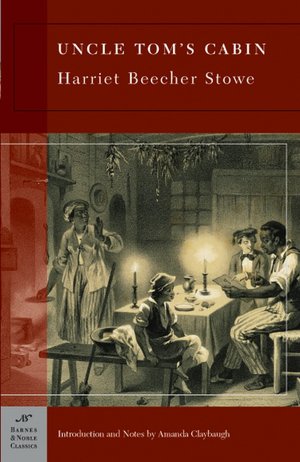- ISBN-13: 9781593081218
- Publisher: Barnes & Noble
- Publication date: 2/1/2005
- Pages: 496
Nearly every young author dreams of writing a book that will literally change the world. A few have succeeded, and Harriet Beecher Stowe is such a marvel. Although the American anti-slavery movement had existed at least as long as the nation itself, Stowe’s Uncle Tom’s Cabin (1852) galvanized public opinion as nothing had before. The book sold 10,000 copies in its first week and 300,000 in its first year. Its vivid dramatization of slavery’s cruelties so aroused readers that it is said Abraham Lincoln told Stowe her work had been a catalyst for the Civil War.
Today the novel is often labeled condescending, but its characters—Tom, Topsy, Little Eva, Eliza, and the evil Simon Legree—still have the power to move our hearts. Though "Uncle Tom” has become a synonym for a fawning black yes-man, Stowe’s Tom is actually American literature’s first black hero, a man who suffers for refusing to obey his white oppressors. Uncle Tom’s Cabin is a living, relevant story, passionate in its vivid depiction of the cruelest forms of injustice and inhumanity—and the courage it takes to fight against them.
Before I get into this, I have an amusing story regarding this novel. I was reading it while waiting for our flight from Osaka back to Seoul and one of the girls asked me what I was reading. We all started discussing various literary classics, and I recapped the book to someone who didn't know what Uncle Tom's Cabin is about. She then asked me, "Wasn't the author black?" .........Oh honey.
Anywho, on to the actual review. I will say that I was not expecting to read what I did. Having been educated for years that Stowe's novel was a contributor to the beginning of the Civil War, I was expecting a much more depressing and militant story. What I got was far easier on slavery and far more Christ-minded. I should have expected that part though, knowing that Stowe's brother was an extremely famous preacher. Tom didn't even make an appearance for quite a while and his cabin really had little to nothing to do with the story.
The writing style was at times eloquent and at times simply wordy. The best characters were highly religiously minded and the relief from their suffering was only their allowance into heaven and the peace that came with their good deeds. At least she was being realistic when depicting the absolute futility of any individual fighting against slavery as an institution, as well as the inability of slaves to alleviate in any part their affliction. The problem that I had, and I'm sure many modern readers have, is her language when referring to the African race. While she was praiseworthy of many of their qualities, she often subscribed to the rhetoric of the day in regards to their inferiority to the white race. In many cases, this was ameliorated by her statement that any creature put in the hell that is slavery would suffer a degradation of character and mental and spiritual acuity, especially with the added neglect of education. However, even these remarks were not enough to remove some of the bitterness of her words. She was a product of her time, though, and the modern reader must take any aspersions in stride. Even with good intent, predominating thought would naturally seep in.
The characters were fairly well fleshed out. There were a couple that could have been afforded a little more play time, but she had so many characters that it was nigh impossible. The most important characters, though, were either appropriately loveable or appropriately hateable. You genuinely appreciate and feel for Mrs. Shelby and the Sinclares in their kindness toward their slaves. The way in which Eva transforms Topsy and touches all who know her is also truly beautiful. Again, if you aren't into religion, you'll probably find that most of this book is hard to swallow. But if you can understand that that is the perspective from which it was written and not scoff at the likelihood of such a saintly nine year old, it's a beautiful story. You hate Legree and cheer when George knocks him down.
The only other problem I had with the novel was the temporary complete disappearance of half of the many characters. Even before we meet Tom, we are acquainted with Eliza's plight, yet after her adventures are assumed to be at an end, it would be lovely to have a little glimpse of her before the final chapter. Also, some of the plot threads' wrap ups seemed highly unrealistic and were, in my opinion, a little too hastily undertaken.
Overall: B+
This novel helped spark the liberation of an entire race in North America and is worth the read for that alone. It's a piece of history. That is not to say that it's even close to the best novel to come out of that period, nor does is it perfect. However, it is a wonderful look into the time period and a plea for the betterment of humanity.

No comments:
Post a Comment